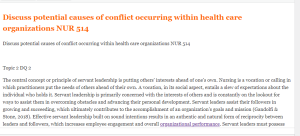Discuss potential causes of conflict occurring within health care organizations NUR 514
Discuss potential causes of conflict occurring within health care organizations NUR 514
Topic 2 DQ 2
The central concept or principle of servant leadership is putting others’ interests ahead of one’s own. Nursing is a vocation or calling in which practitioners put the needs of others ahead of their own. A vocation, in its social aspect, entails a slew of expectations about the individual who holds it. Servant leadership is primarily concerned with the interests of others and is constantly on the lookout for ways to assist them in overcoming obstacles and advancing their personal development. Servant leaders assist their followers in growing and succeeding, which ultimately contributes to the accomplishment of an organization’s goals and mission (Gandolfi & Stone, 2018). Effective servant leadership built on sound intentions results in an authentic and natural form of reciprocity between leaders and followers, which increases employee engagement and overall organizational performance. Servant leaders must possess critical characteristics such as effective communication, a commitment to people’s growth, community building, increased awareness, persuasion, foresight, and stewardship.
When nurse leaders show concern for their teams and subordinates and assist them in meeting their needs, they act as servant leaders whose vocation is to serve others. Nursing is a profession that embodies the values of servant leadership, as nurses empathize with patients and their concerns and needs (Thomas, 2018). Nurses prioritize the needs of patients and ensure that they receive the best

care possible for their condition. Nurses are servant leaders because they advocate for the best interests of patients, their families, and populations. Examine possible sources of conflict within health care organizations. 514 NUR
In practice, nurse managers and leaders demonstrate servant leadership in a variety of ways. Mentoring newly graduated nurses as they enter the workforce is an aspect of my practice that demonstrates the vocation of nursing as one of serving the interests of others. These new nurses require effective mentorship to build confidence and recognize their potential to perform as well as those with over ten years of experience.
Click here to ORDER NOW FOR AN ORIGINAL PAPER ON Discuss potential causes of conflict occurring within health care organizations NUR 514
Discuss potential causes of conflict occurring within health care organizations NUR 514 References
Gandolfi, F., & Stone, S. (2018). Leadership, Leadership Styles, and Servant Leadership.
Journal of Management Research (09725814), 18(4), 261–269. https://www.lasnny.org/wp-content/uploads/2018/11/Leadership-Leadership-Styles-and-Servant-Leadership.pdf
Thomas, J. S. (2018). Applying servant leadership in practice. Nursing Leadership and
Management: Leading and Serving. 1, Ch. 3
Discuss potential causes of conflict occurring within health care organizations NUR 514 Grading Rubric Guidelines
| Performance Category | 10 | 9 | 8 | 4 | 0 |
| Scholarliness
Demonstrates achievement of scholarly inquiry for professional and academic decisions. |
|
|
|
|
|
| Performance Category | 10 | 9 | 8 | 4 | 0 |
| Application of Course Knowledge –
Demonstrate the ability to analyze, synthesize, and/or apply principles and concepts learned in the course lesson and outside readings and relate them to real-life professional situations |
|
|
|
|
|
| Performance Category | 5 | 4 | 3 | 2 | 0 |
| Interactive Dialogue
Replies to each graded thread topic posted by the course instructor, by Wednesday, 11:59 p.m. MT, of each week, and posts a minimum of two times in each graded thread, on separate days. (5 points possible per graded thread) |
|
Summarizes what was learned from the lesson, readings, and other student posts for the week. |
|
|
|
| Minus 1 Point | Minus 2 Point | Minus 3 Point | Minus 4 Point | Minus 5 Point | |
| Grammar, Syntax, APA
Note: if there are only a few errors in these criteria, please note this for the student in as an area for improvement. If the student does not make the needed corrections in upcoming weeks, then points should be deducted. Points deducted for improper grammar, syntax and APA style of writing. The source of information is the APA Manual 6th Edition |
|
|
|
|
|
| 0 points lost | -5 points lost | ||||
| Total Participation Requirements
per discussion thread |
The student answers the threaded discussion question or topic on one day and posts a second response on another day. | The student does not meet the minimum requirement of two postings on two different days | |||
| Early Participation Requirement
per discussion thread |
The student must provide a substantive answer to the graded discussion question(s) or topic(s), posted by the course instructor (not a response to a peer), by Wednesday, 11:59 p.m. MT of each week. | The student does not meet the requirement of a substantive response to the stated question or topic by Wednesday at 11:59 pm MT. |

